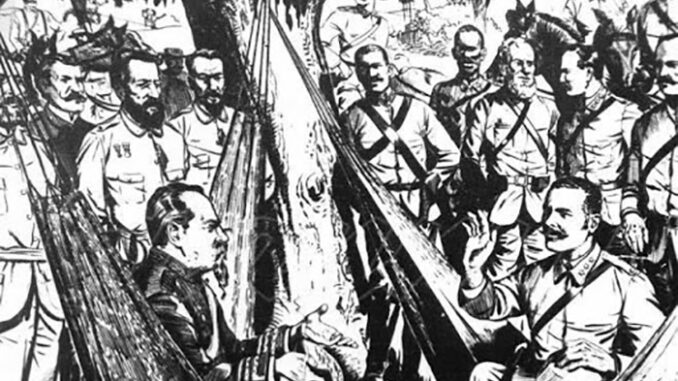The shadow of the mangoes gave shelter a day like today 144 years ago to the Baraguá Protest, a symbol of the iron will of Cubans to abolish slavery and achieve independence from Spain.
After 10 years of a war (1868-1878) impacted by disunity, indiscipline, caudillismo, among other conflicts, some found in the signing of the Zanjón Pact – which sought peace without the true autonomy of the metropolis – the solution to hostilities, just when the mambises resumed the fight for freedom in the east and center of the island, Prensa Latina publishes.
On March 15, 1878, in a town near the eastern province of Santiago de Cuba known as Mangos de Baraguá, Lieutenant Antonio Maceo and other high-ranking chiefs and officials showed their refusal to accept the agreement, which did not provide any response to the situation that led to the war and was “a shameful surrender”, in the opinion of the hero.
When the Spanish governor and peacemaker Arsenio Martínez Campos tried to read the Pact, Maceo responded with a resounding: “Keep that document, we don’t want to know anything about it”, to which the question of his interlocutor continued: “Don’t we understand each other??, and again the sharp reply of the Cuban: ?No, we don’t understand each other?.
History has passed the significance of this fact with which, according to the historical leader Fidel Castro, the patriotic spirit of the Cuban people reached its peak “and the flags of the Homeland and of the true Revolution, with independence and with social justice, were placed in their highest seat?.
Years later, Antonio Maceo would say that three times in his anguished life as a revolutionary he suffered the strong and tempestuous emotions of pain and sadness, when referring to the death of his parents and the Zanjón Pact.
The historian Ernesto Limia, in an assessment of the event, assured that the Baraguá Protest was a demonstration of revolutionary intransigence, which rescued the independence spirit of not kneeling.
That was the encouragement that led to take up arms again in the Necessary War (1895-1898) organized by José Martí years later, which ended with the intervention of the United States in his last moments and the award of victory over Spain.
Six decades later, the island was definitively freed from foreign domination, with the triumph of the Revolution on January 1, 1959 and the flight of dictator Fulgencio Batista from the country.
In the same place where the Baraguá Protest took place, but on February 19, 2000, Cuba ratified by oath the will to resist in the new scenario of the battle of ideas that survives today, with technologies and digital platforms such as terrain of constant struggle for truth and justice.

